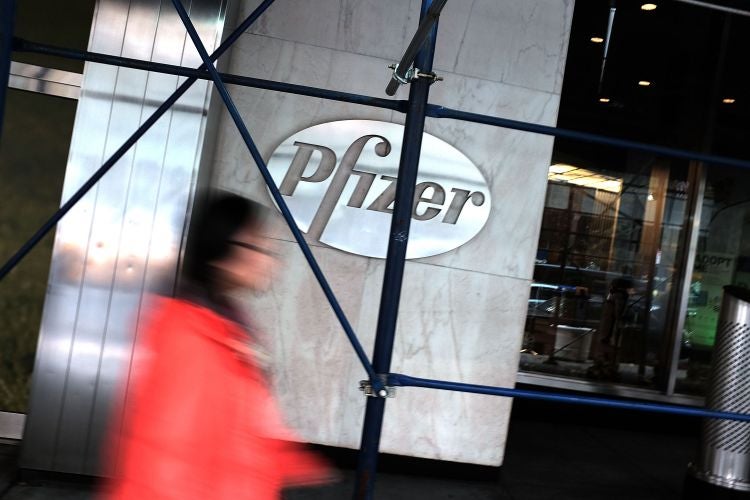Pfizer's record fine for pharmaceutical funny business is no laughing matter
The Competition & Markets Authority has accused the company of excessive and unfair pricing over an epilespy treatment supplied to NHS patients

Your support helps us to tell the story
This election is still a dead heat, according to most polls. In a fight with such wafer-thin margins, we need reporters on the ground talking to the people Trump and Harris are courting. Your support allows us to keep sending journalists to the story.
The Independent is trusted by 27 million Americans from across the entire political spectrum every month. Unlike many other quality news outlets, we choose not to lock you out of our reporting and analysis with paywalls. But quality journalism must still be paid for.
Help us keep bring these critical stories to light. Your support makes all the difference.
An £84.2m record fine from the Competition & Markets Authority for pharmaceutical funny business is no laughing matter, even to a giant of the industry like Pfizer.
It’ll take more than a few bottles of its signature Viagra to pay that sort of sum, but pay it Pfizer should.
Here’s why. Prior to 2012 Pfizer manufactured and distributed a drug under the name of Epanutin. The treatment is used by people with epilepsy, to control seizures.
However, at that point the company sold the rights to distribute the drug to another company, Flynn Pharma, which then de-branded the drug.
Sort of. Because advice from the Epilepsy Society at the time noted that the capsules would still be the same size and the same colour. They would even have “Epanutin” imprinted on them. They would still be manufactured by Pfizer. It’s just that the packaging would read Phenytoin Sodium Flynn Hard Capsules to reflect the change of distributor.
All that was important for people with epilepsy to know. There have been occurrences when switching from a branded product to a generic has resulted in seizures. Slight changes in the manufacturing process, or to the tablets’ covering, has been known to do that. Which can have big implications. People with epilepsy have to prove they have been seizure free for six months to be able to drive, for example. Their consultants also have to certify that it is unlikely that they will have future seizures.
So, as you can see, having an effective treatment regimen in place is extremely important. What matters is not so much whether the drug used is a branded one or a generic but that the manufacturing is consistent so the patient’s treatment is consistent.
That wasn’t going to be a problem in this case. What was a problem is that Pfizer’s deal with Flynn took the drug out of an agreed pricing regime in place with the NHS, thus allowing the two firms involved to drastically increase its price, by a staggering 2,600 per cent.
NHS spending on the capsules, used by 48,000 people, shot up from £2m annually to £50m in 2013. Because patients couldn’t be switched to a competing product (see the above point about consistency of manufacture and treatment) the NHS was caught in a bind. It had no choice but to pay up.
For its part, Pfizer said the drug was a loss making product and the deal with Flynn – which itself was fined £5.2m – secured that all important consistency of supply.
If the former were true, however, the CMA said that Pfizer would have made back its losses within two months. It also points out that the prices charged for Epanutin, or Flynn whatever, in Europe were nowhere near as high. The two companies were therefore found to have unfairly exploited their monopoly at the expence of the NHS.
The Government is seeking to tighten up on such wheezes, and so it should. It should also ensure that the proceeds from the fine find their way back to the NHS. The money will be paid to the Treasury, unless Pfizer succeeds with an appeal, but it is the NHS that is the loser here.
As for the industry, none of this reflects very well on it.
The private sector tends to do a better job when it comes to researching new treatments than does the public sector, in the form of university pharmacology labs.
But researching new drugs is time consuming, risky and expensive. To fund it, drug companies have to raise capital, and provide it with a return. In other words, they have to make profits, even if that makes life saving treatments very expensive.
What Pfizer, and Flynn, did, in this case went way beyond that. Their actions, as described by the CMA, were cynical and immoral. Sadly, they’re hardly the only offenders when it comes to this sort of price gouging.
Behaviour like that gives drug companies a bad name. Big pharma has a right, and a need, to make profits. It doesn’t, and shouldn’t, have the right to profiteer.
Subscribe to Independent Premium to bookmark this article
Want to bookmark your favourite articles and stories to read or reference later? Start your Independent Premium subscription today.
Join our commenting forum
Join thought-provoking conversations, follow other Independent readers and see their replies
Comments